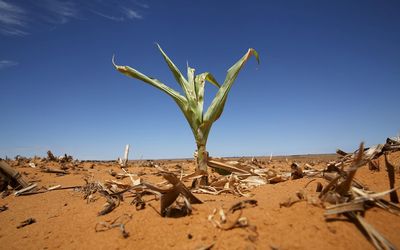State provides for black farmers’ survival
by Wandile Sihlobo,
2016-03-01 05:47:44.0
THIS year’s budget speech was special to me as I was in a workshop with farmers at the time it was presented, which gave me the opportunity to relay to them, in layman’s terms, what they can expect from the government. Their serious concern for the state of our economy struck me deeply, particularly since for many farmers in SA, the financial assistance offered by the government to cope with the drought could make or break their enterprises.
In the morning leading up to the budget speech, I was optimistic that there would be significant increases in allocations to agricultural financial institutions such as the Land Bank, to assist farmers in this challenging time. That turned out to be a semi-fulfilled wish. The opening of Finance Minister Pravin Gordhan’s speech sounded encouraging and pragmatic, suggesting the nation must be frank about the economic challenges, the drought among them. There was a glimmer of hope for the agricultural sector through the allocation of R15bn in the next three years via the Land Bank concessionary loan facility to assist drought-afflicted farmers. A key concern, however, is whether all climatically affected farmers will be able to access this finance.
It was encouraging, though, that there was specific support for small-scale farmers, in particular emerging black farmers, through the allocation of R2.8bn for projects including the development of agri-parks in rural economies. This is of great importance as some small-scale farmers have been hard-hit, losing all their crops and livestock.
Last week, Grain SA indicated that small-scale farmers would need at least R1bn in soft loans to cope with the current drought. As such, if the allocated R2.8bn is used efficiently and spent strategically, it will lessen the burden of the drought.
This fund could also assist in market development through the agri-parks process, as a value-adding initiative to small-scale farming operations by facilitating market-access.
The correct timing of this process will be essential.
At the end of the budget speech, one of the farmers in our workshop remarked that the word "drought" had been mentioned a number of times, but actual allocations to tackle it fell short of expectations.
Although I share his view to a certain extent, in light of the financial constraints on the economy, I can understand some of the restrictions and reservations made in certain budgetary allocations. It is important to remember that the effects of the drought are not only limited to agricultural production; it has affected the economy as a whole.
In fact, the knock-on effect of the drought is one of the key factors constraining SA’s economic growth. This has been acknowledged by institutions such as the International Monetary Fund, which forecasts this year’s gross domestic product growth at just 0.7%. Considering all of this, the aforementioned allocations will aid and add value to the agricultural sector, although more could have been done, given the importance of the risk posed to the country’s food security, jobs and economic development.
I base this view on the recent reports from Agri SA, which indicate that the agricultural sector will need at least R12bn to tackle the drought challenge, a serious threat to food security. This is of critical importance as it would assist farmers in getting back to production in the next season if permitted by climatic conditions.
More importantly, at a micro-level, primary agriculture contributes to national food security and sustains more than 800,000 jobs, a significant number in a country that is grappling with an exceptionally high unemployment rate.
I am, however, confident that organised agriculture and the government will be able to work together to ensure that the country does not lose its agricultural production capacity so we can remain a food basket for the region.
• Sihlobo is an economist at Grain SA. He writes in his own capacity. Follow him on twitter @WandileSihlobo

As the worst drought since records started in 1904 decimates food crops, import costs are surging. Picture: REUTERS/SIPHIWE SIBEKO
THIS year’s budget speech was special to me as I was in a workshop with farmers at the time it was presented, which gave me the opportunity to relay to them, in layman’s terms, what they can expect from the government. Their serious concern for the state of our economy struck me deeply, particularly since for many farmers in SA, the financial assistance offered by the government to cope with the drought could make or break their enterprises.
In the morning leading up to the budget speech, I was optimistic that there would be significant increases in allocations to agricultural financial institutions such as the Land Bank, to assist farmers in this challenging time. That turned out to be a semi-fulfilled wish. The opening of Finance Minister Pravin Gordhan’s speech sounded encouraging and pragmatic, suggesting the nation must be frank about the economic challenges, the drought among them. There was a glimmer of hope for the agricultural sector through the allocation of R15bn in the next three years via the Land Bank concessionary loan facility to assist drought-afflicted farmers. A key concern, however, is whether all climatically affected farmers will be able to access this finance.
It was encouraging, though, that there was specific support for small-scale farmers, in particular emerging black farmers, through the allocation of R2.8bn for projects including the development of agri-parks in rural economies. This is of great importance as some small-scale farmers have been hard-hit, losing all their crops and livestock.
Last week, Grain SA indicated that small-scale farmers would need at least R1bn in soft loans to cope with the current drought. As such, if the allocated R2.8bn is used efficiently and spent strategically, it will lessen the burden of the drought.
This fund could also assist in market development through the agri-parks process, as a value-adding initiative to small-scale farming operations by facilitating market-access.
The correct timing of this process will be essential.
At the end of the budget speech, one of the farmers in our workshop remarked that the word "drought" had been mentioned a number of times, but actual allocations to tackle it fell short of expectations.
Although I share his view to a certain extent, in light of the financial constraints on the economy, I can understand some of the restrictions and reservations made in certain budgetary allocations. It is important to remember that the effects of the drought are not only limited to agricultural production; it has affected the economy as a whole.
In fact, the knock-on effect of the drought is one of the key factors constraining SA’s economic growth. This has been acknowledged by institutions such as the International Monetary Fund, which forecasts this year’s gross domestic product growth at just 0.7%. Considering all of this, the aforementioned allocations will aid and add value to the agricultural sector, although more could have been done, given the importance of the risk posed to the country’s food security, jobs and economic development.
I base this view on the recent reports from Agri SA, which indicate that the agricultural sector will need at least R12bn to tackle the drought challenge, a serious threat to food security. This is of critical importance as it would assist farmers in getting back to production in the next season if permitted by climatic conditions.
More importantly, at a micro-level, primary agriculture contributes to national food security and sustains more than 800,000 jobs, a significant number in a country that is grappling with an exceptionally high unemployment rate.
I am, however, confident that organised agriculture and the government will be able to work together to ensure that the country does not lose its agricultural production capacity so we can remain a food basket for the region.
• Sihlobo is an economist at Grain SA. He writes in his own capacity. Follow him on twitter @WandileSihlobo



























Change: 1.61%
Change: 1.50%
Change: 1.82%
Change: 0.74%
Change: 4.50%
Data supplied by Profile Data
Change: -0.27%
Change: 0.26%
Change: 1.61%
Change: 0.00%
Change: 0.35%
Data supplied by Profile Data
Change: -0.33%
Change: -0.30%
Change: -0.40%
Change: 0.07%
Change: -0.23%
Data supplied by Profile Data
Change: 1.58%
Change: 1.07%
Change: 1.14%
Change: 3.88%
Change: -0.03%
Data supplied by Profile Data